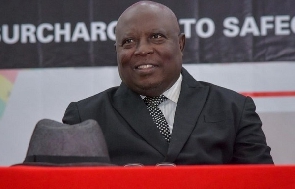Accra, Feb. 28, GNA - Wreaths were laid at the Freedom Monument, Osu, on Saturday in commemoration of the 61st anniversary of three ex-servicemen who were gunned down at the Christianborg Crossroads on February 28, 1948, while going to present a petition to the British Colonial Governor, Sir Gerald Creasy.
They were Sergeant Adjetey, Corporal Attipoe and Private Odartey Lamptey, all members of the Gold Coast Regiment of the Royal West African Frontier Force that fought alongside the allied forces during the Second World War.
The colonialists had demobilized them promising to resettle them but had reneged.
Lt. Gen. Joseph Smith, Minister of Defence, laid a wreath on behalf of the government and people of Ghana and Rear Admiral R. S Nuno, Acting Chief of Defence Staff, laid one on behalf of the security services. The Chairman of the Veterans Association of Ghana, Air Vice Marshal Odartey Barnor laid one on behalf of the veterans, while the Osu Mantse, Nii Nortey Owuo III, laid one on behalf of traditional rulers. Special prayers were said for the love, dedication and the service the three soldiers rendered to the country during the colonial era and prayed for peace and stability in Ghana and the world. The acting Osu Klottey Wulomo, Nii Lantey Okunkah poured libation. Relatives of the fallen heroes, Ministers, Parliamentarians as well as other important dignities graced the occasion.
Ex-WOI Robert Kumah, who read the history said on Saturday, February 28, 1948, a number of ex-servicemen were marching from Accra to Christianborg Castle to present a petition to the Governor on their unpaid war benefits when they were intercepted at the crossroads by a contingent of armed policemen.
The contingent, led by British Superintendent, Mr Imray ordered that they dispersed and when they refused to obey, he gave an order to the police to open fire and the three ex-servicemen were killed. The ex-soldiers had fought alongside the allied forces in the Gold Coast Regiment of the Royal West African Frontier Force during the Second World War and had returned home poor and were not paid their gratuities. After several appeals to the colonial government to consider their plight had failed, the ex-servicemen decided that a direct appeal should be made to the British Colonial Governor of the Gold Coast. News about the death of the servicemen spread rapidly, leading to a situation where law and order broke down in Accra and other parts of the country. It encouraged anti-colonial movements to press the British government to institute a committee to investigate the killings and general disorder.
The Committee recommended self-government for the Gold Coast, which subsequently led to the attainment of political independence for the country. 28 Feb. 09
General News of Saturday, 28 February 2009
Source: GNA
















